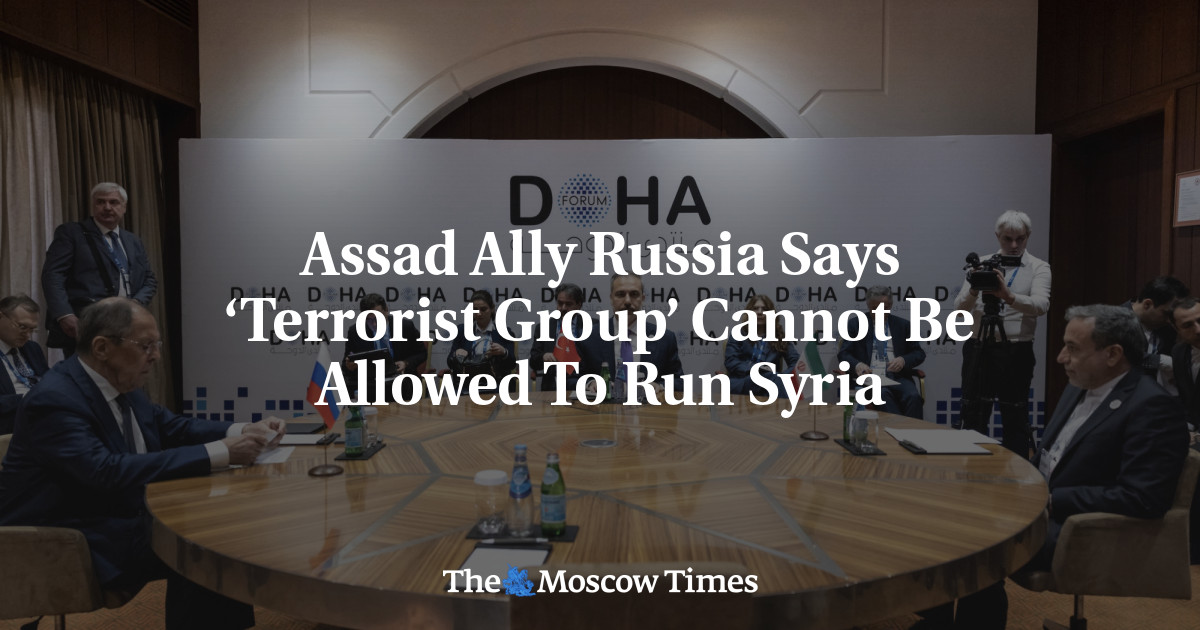Assad Ally Russia Says ‘Terrorist Group’ Cannot Be Allowed To Run Syria – The Moscow Times

Russian Foreign Minister Sergei Lavrov said Saturday that Syria must not be allowed to fall into the hands of a “terrorist group” as Islamist-led rebels advance on President Bashar al-Assad’s seat of power.
Lavrov spoke after talks on Saturday with fellow Assad ally Iran and opposition supporter Turkey in Qatar, aimed at preventing Syria from collapsing into chaos after the lightning rebel advances of recent days.
“It’s inadmissible to allow the terrorist group to take control of territory in violation of agreements,” Lavrov said, citing a 2015 UN Security Council Resolution which he said “strongly reiterated sovereignty, territorial integrity and unity of the Syrian Arab Republic”.
Lavrov was referring to Hayat Tahrir al-Sham, the Islamist group which has headed the assault and is rooted in the Syrian branch of Al-Qaeda. HTS has sought to soften its image in recent years but remains proscribed as a “terrorist organisation” by Western governments.
Lavrov and Iran’s Abbas Araghchi met with Turkey’s Hakan Fidan on the sidelines of the Doha Forum, an annual gathering for political dialogue.
Araghchi said the three ministers agreed on the need to start “political dialogue between the Syrian government and legitimate opposition groups”.
The three countries have been partners since 2017 in the so-called Astana process seeking to end the civil war that has persisted in Syria since 2011.
Despite repeated violations, a 2020 ceasefire agreement brokered by Russia and Turkey had largely frozen the conflict for several years but it was blown apart by the shock offensive the rebels launched late last month.
Moscow and Tehran have offered military support to help Assad’s forces hold off the rebels.
Ankara backs some of the rebel groups involved in the offensive and looks favourably at HTS’ success so far.
However, the scale of the collapse of Assad’s forces has taken observers by surprise with conflicting reports about how close the rebels have come to Assad’s seat of power in Damascus.
On Saturday, a rebel commander said, “Our forces have begun the final phase of encircling the capital”, but the defence ministry said “there is no truth to news claiming” the army has withdrawn from positions near Damascus.
AFP has been unable to independently verify some of the information provided by the government and the rebels, as its journalists in Syria cannot reach the areas around Damascus where the rebels claim to have entered.
‘Reconcile’
Qatar – which gave early support to the rebels after Assad’s government crushed a peaceful uprising in 2011 – remains a fierce critic of the Syrian leader but is calling for a negotiated end to the fighting.
Speaking at the same event in Doha, Qatar’s Prime Minister Sheikh Mohammed bin Abdulrahman bin Jassim Al-Thani said Assad had failed to “seize these opportunities” during a period of calm in the country’s war both “on the return of the refugees or on reconciling with his own people”.
Ahead of the three-way talks, Araghchi said he had “very frank and direct” bilateral meetings with his Turkish counterpart and the ruler of Qatar, Sheikh Tamim bin Hamad Al-Thani.
Turkish President Recep Tayyip Erdogan called on Assad earlier this week to “reconcile with his people”. On Friday he said he hoped the rebel advance would “continue without incident”.
Ahead of the talks in Doha, Araghchi met with his Iraqi and Syrian counterparts in Baghdad on Friday, warning that the rebel advance poses a “threat” to the whole Middle East.
“This threat will not be limited to Syria and will affect Syria’s neighbouring countries such as Iraq, Jordan and Turkey,” he said.
Related
Qatar emphasizes importance of reaching agreement between US, Iran
CAIROQatar's Prime Minister Sheikh Mohammed bin Abdulrahman Al-Thani stressed the critical need for an agreement between the US and
International Women’s Day: Seeking a Balance with Ghada Al Subaey
1309’s Ghada Al Subaey of Qatar celebrates the many layers of femininity in her recent drop, called Labyrinth of Light. This International Women’s Day, the
Discover Ooredoo Plans and Services in Qatar
Ooredoo is the household name in the field of telecommunications and provides a full portfolio of telecom services: mobile plans for everyone, home
What Will The Imminent Qatar Airways Widebody Order Include?
Which Airline Alliance Do You Prefer To Fly With?












